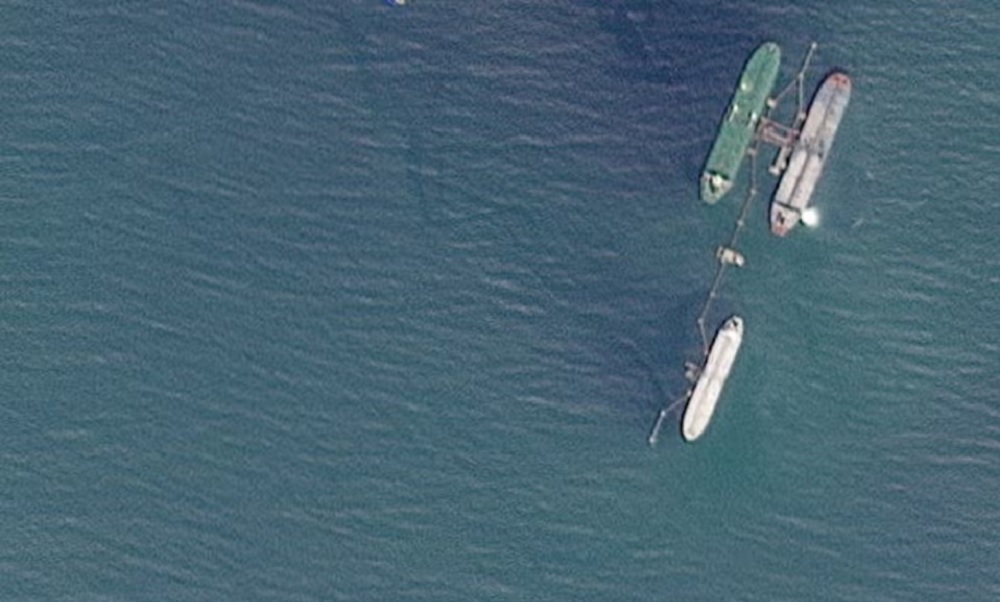World
Israeli jets strike Houthi targets in Yemen after Tel Aviv attack
Israel’s military spokesperson said the port had been used by the Houthis to receive weapons shipments from Iran. The targets, more than 1,700 km (1,056 miles) from Israel, included dual-use sites such as energy infrastructure, he said.

Israeli fighter jets struck Houthi military targets near Yemen’s Hodeidah port on Saturday, killing at least three people and wounding 87, a day after a drone launched by the Iranian-backed group hit Israeli economic hub Tel Aviv.
Most of the wounded suffered severe burns in air strikes that targeted oil facilities and a power station, Al-Masirah TV, the main television news outlet run by Yemen’s Houthi movement, quoted the health ministry as saying.
Hodeidah residents told Reuters by phone that explosions were heard throughout the city during an intensive bombardment, and Al-Masirah TV said civil defence forces and firefighters were trying to extinguish fires in the port’s oil tanks.
Israel’s military spokesperson said the port had been used by the Houthis to receive weapons shipments from Iran. The targets, more than 1,700 km (1,056 miles) from Israel, included dual-use sites such as energy infrastructure, he said.
Israel had informed allies before the strike, which the military said was carried out by Israeli F-15 fighters that all returned safely.
The Houthis’ Supreme Political Council said there would be an “effective response” to the strikes. Houthi military spokesperson Yahya Saree said the Houthis “will not hesitate to strike vital targets of the Israeli enemy.”
The strike on Yemen, which Israeli officials said came after more than 200 Houthi attacks on Israel, underlined fears that the Gaza war, triggered by the Hamas-led attack on Israel on Oct. 7, could spiral into a regional conflict.
“The fire that is currently burning in Hodeidah is seen across the Middle East and the significance is clear,” Israeli Defence Minister Yoav Gallant said in a statement.
“The Houthis attacked us over 200 times. The first time that they harmed an Israeli citizen, we struck them. And we will do this in any place where it may be required.”
On Friday, a long-range Iranian-made drone launched from Yemen hit the centre of Tel Aviv in an attack claimed by the Houthis, killing one man and wounding four others.
That attack followed an escalation in the daily exchange of fire between Israeli forces and the Iranian-backed Hezbollah militia in southern Lebanon and came as Prime Minister Benjamin Netanyahu prepares to travel to Washington, where he is due to address the U.S. Congress.
Netanyahu called on the international community to step up pressure on Tehran and its proxies – the Houthis, Hamas and Hezbollah – and in so doing help secure international trade routes.
“Whoever wants to see a stable and safe Middle East needs to stand against Iran’s axis of evil, and support Israel’s struggle against Iran and its proxies,” Netanyahu said.
Meanwhile, Iran’s foreign ministry spokesperson, Nasser Kanaani, condemned the Israeli attacks and “warned against the risk of escalation of tension and the spread of war in the region as a result of the dangerous adventurism of the Zionists,” Iranian state media reported.
In a statement, Hezbollah also condemned the attack on Hodeidah, describing it as “a foolish step … that marks a new and dangerous phase of the extremely important ongoing confrontation.”
As the war in Gaza has gone on, the Houthis have stepped up attacks against Israel and Western targets, saying they are acting in solidarity with the Palestinians.
They began attacking Western ships in the Red Sea and the Gulf of Aden. Their attacks have upended global trade by forcing ship owners to reroute vessels away from the vital Suez Canal shortcut, and drawn retaliatory U.S. and British strikes since February.
“A brutal Israeli aggression targeted civilian buildings, oil facilities and power station in Hodeidah aiming at pressuring Yemen to stop supporting Gaza,” Mohammed Abdulsalam, chief negotiator for Houthi movement, said on X.
He said the attack would “only increase our determination, steadfastness, (and) continuity”.
A Saudi ministry of defence spokesperson said that the kingdom was not involved in or participating in the targeting of Hodeidah, adding Saudi Arabia “will not allow its airspace to be infiltrated by any party” whatsoever.
Egypt, which has been trying to help broker a Gaza ceasefire and hostage release deal, said it was following “with great concern” the Israeli strike.
Hamas stormed Israeli towns on Oct. 7, killing around 1,200 people and taking more than 250 hostages back to Gaza, according to Israeli tallies. Since then, nearly 39,000 Palestinians have been killed in Israel’s assault on the Gaza Strip, according to health authorities in the enclave.
World
Venezuela-US tensions spike in wake of seized tanker as Nobel winner vows change

Venezuelan opposition leader Maria Corina Machado on Friday promised political change after slipping out of the country in secret to collect the Nobel Peace Prize, as the shock waves intensified from the Trump administration’s seizure of an oil tanker earlier this week.
That escalation came on the heels of a large-scale U.S. military buildup in the southern Caribbean as President Donald Trump campaigns to oust Venezuelan leader Nicolas Maduro, pushing relations to their most volatile point in years, Reuters reported.
The effects could ripple through the region, with Venezuelan oil exports falling sharply and crisis-stricken Cuba, already straining to power its grid, at risk of losing supply.
The U.S. seizure of the Skipper tanker off Venezuela’s coast on Wednesday marked the first U.S. capture of Venezuelan oil cargo since sanctions were imposed in 2019.
The vessel is now heading to Houston, where it will offload its cargo onto smaller ships, Reuters reported.
The Trump administration does not recognize Maduro, in power since 2013, as Venezuela’s legitimate leader.
Washington has signalled more seizures are planned as part of efforts to choke off sanctioned oil flows, and subsequently imposed new sanctions on three nephews of Maduro’s wife and six tankers linked to them.
The U.S. military presence in the Caribbean has grown as Trump in recent weeks has discussed potential military intervention in Venezuela, based on accusations that the country ships narcotics to the United States. The Venezuelan government has denied the accusations.
So far there have been over 20 U.S. military strikes in the Caribbean and Pacific against suspected drug vessels this year, in which nearly 90 people have been killed, alarming human rights advocates and stirring debate among U.S. lawmakers.
While many Republicans have backed the campaign, Democrats have questioned whether the campaign is illegal and urged more transparency, including the release of a full, unedited video, opens new tab of strikes on a suspected drug-trafficking boat.
MACHADO DEFIES BAN, URGES TRANSITION
Machado defied a decade-long travel ban and a period in hiding to travel to Oslo on Thursday, noting that she would soon bring the Nobel Peace Prize back home to Venezuela.
She said Maduro would leave power “whether there is a negotiated changeover or not,” vowed she is focused on a peaceful transition, and thanked Trump for his “decisive support.”
Machado is aligned with U.S. hardliners who accuse Maduro of ties to criminal networks – claims that U.S. intelligence has reportedly questioned.
When asked at a press conference in Oslo if she believed U.S. intervention was needed in Venezuela, Machado replied, “We are asking the world to help us.”
Venezuela condemned the tanker seizure as “blatant theft” and “international piracy,” saying it would file complaints with international bodies.
At the same time, Venezuelan lawmakers took a step to withdraw the country from the International Criminal Court, which is currently investigating alleged human rights abuses in the South American country.
Adding to the friction, the Venezuelan government announced the suspension of a U.S. migrant repatriation flight on Friday. A U.S. official countered that deportation flights would continue.
World
Putin arrives in Ashgabat to hold series of meetings

Russian President Vladimir Putin has arrived in Turkmenistan’s capital for a two-day visit.
According to TASS, the presidential aircraft of the Rossiya Special Flight Detachment landed near the presidential terminal of Ashgabat International Airport, commonly referred to as the “small bird” for its distinctive design.
During his visit, Putin will attend an international forum titled “Peace and Trust: Unity of Goals for a Sustainable Future” and hold several bilateral meetings.
The Kremlin has confirmed talks with Turkish President Recep Tayyip Erdogan, while the Iranian Embassy has announced that a meeting with President Masoud Pezeshkian is also planned.
The Ashgabat forum will also be attended by Turkmen President Serdar Berdymukhamedov, along with the presidents of Armenia, Iraq, Kazakhstan, Kyrgyzstan, Uzbekistan and Tajikistan, as well as the prime ministers of Azerbaijan, Hungary, Georgia and Pakistan.
World
Trump launches gold card program for expedited visas with a $1 million price tag

President Donald Trump’s administration officially launched his “Trump Gold Card” visa program on Wednesday to provide a pathway, with a steep price, for non-U.S. citizens to get expedited permission to live in the United States.
The website Trumpcard.gov, complete with an “apply now” button, allows interested applicants to pay a $15,000 fee to the Department of Homeland Security for speedy processing, Reuters reported.
After going through a background check or vetting process, applicants must then make a “contribution” — the website also calls it a “gift” — of $1 million to get the visa, similar to a “Green Card,” which allows them to live and work in the United States.
“Basically it’s a Green Card, but much better. Much more powerful, a much stronger path,” Trump told reporters at the White House. “A path is a big deal. Have to be great people.”
Commerce Secretary Howard Lutnick said some 10,000 people have already signed up for the gold card during a pre-registration period and he expected many more to do so. “I would expect over time that we’d sell, you know, thousands of these cards and raise, you know, billions, billions of dollars,” Lutnick told Reuters in a brief interview.
Lutnick said the gold card program would bring people into the United States who would benefit the economy. He compared that to “average” Green Card holders, whom he said earned less money than average Americans and were more likely to be on or have family members on public assistance. He did not provide evidence for that assertion.
Trump’s administration has pursued a broad crackdown on immigration, deporting hundreds of thousands of people who were in the country illegally and also taking measures to discourage legal immigration.
The gold card program is the Trump version of a counter balance to that, designed to make money for the U.S. Treasury in the same way the president, a former New York businessman and reality television host, has said his tariff program has successfully done.
Lutnick noted that there was also a corporate version of the gold card that allowed companies to get expedited visas for employees they wanted to work in the United States, for a $2 million contribution per employee.
-

 Latest News2 days ago
Latest News2 days agoMuttaqi: Afghanistan’s progress requires both religious and modern education
-

 Sport4 days ago
Sport4 days agoILT20: Desert Vipers edge Gulf Giants in historic super over thriller
-

 Regional4 days ago
Regional4 days agoSix Pakistani soldiers killed in TTP attack in Kurram District
-

 Business4 days ago
Business4 days agoTrade bodies warn almost 11,000 Afghan transit containers stuck at Karachi port
-

 World4 days ago
World4 days agoPowerful 7.6 earthquake hits northern Japan, tsunami warnings issued
-

 Latest News3 days ago
Latest News3 days agoTrump calls Afghanistan a ‘hellhole’ country as US expands immigration restrictions
-

 Sport3 days ago
Sport3 days agoCommanding wins for Arman FC and Sarsabz Yashlar in Afghanistan Champions League
-

 Latest News5 days ago
Latest News5 days agoPakistan’s top general calls on IEA to pick between ties with Islamabad or TTP
























